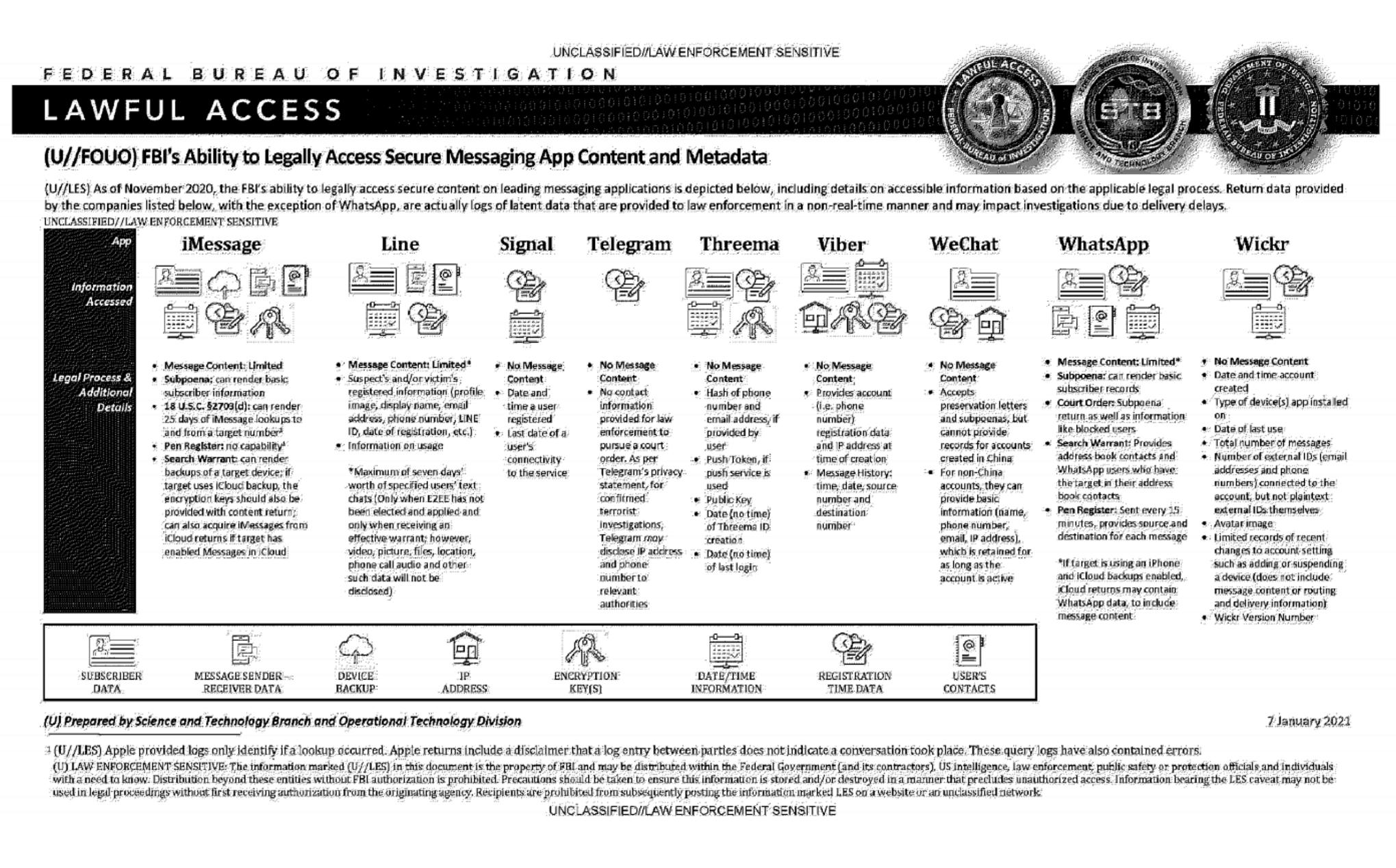An official FBI document dated January 2021, obtained by the American association "Property of People" through the Freedom of Information Act.
This document summarizes the possibilities for legal access to data from nine instant messaging services: iMessage, Line, Signal, Telegram, Threema, Viber, WeChat, WhatsApp and Wickr. For each software, different judicial methods are explored, such as subpoena, search warrant, active collection of communications metadata ("Pen Register") or connection data retention law ("18 USC§2703"). Here, in essence, is the information the FBI says it can retrieve:
-
Apple iMessage: basic subscriber data; in the case of an iPhone user, investigators may be able to get their hands on message content if the user uses iCloud to synchronize iMessage messages or to back up data on their phone.
-
Line: account data (image, username, e-mail address, phone number, Line ID, creation date, usage data, etc.); if the user has not activated end-to-end encryption, investigators can retrieve the texts of exchanges over a seven-day period, but not other data (audio, video, images, location).
-
Signal: date and time of account creation and date of last connection.
-
Telegram: IP address and phone number for investigations into confirmed terrorists, otherwise nothing.
-
Threema: cryptographic fingerprint of phone number and e-mail address, push service tokens if used, public key, account creation date, last connection date.
-
Viber: account data and IP address used to create the account; investigators can also access message history (date, time, source, destination).
-
WeChat: basic data such as name, phone number, e-mail and IP address, but only for non-Chinese users.
-
WhatsApp: the targeted person's basic data, address book and contacts who have the targeted person in their address book; it is possible to collect message metadata in real time ("Pen Register"); message content can be retrieved via iCloud backups.
-
Wickr: Date and time of account creation, types of terminal on which the application is installed, date of last connection, number of messages exchanged, external identifiers associated with the account (e-mail addresses, telephone numbers), avatar image, data linked to adding or deleting.
TL;DR Signal is the messaging system that provides the least information to investigators.

There's a lot of misinformation about Facebook on Reddit. They absolutely deserve scrutiny, but their main problem has always been growing too big too fast and all regular capitalism stuff. If you actually look further into their scandals than Reddit comment sections it becomes apparent that most of their issues (Cambridge Analytica, general misinformation, hate speech, etc) comes from just regular ol corporate incompetence at a massive scale rather than maliciousness. I don't know if that makes anyone feel any better lol.
They are trying to turn it around though and they're investing a shit ton in privacy and trying to tackle "bad actors" and misinformation problems on their platforms (because I guess the scrutiny worked). They're pushing heavily for Messenger to be fully E2EE like WhatsApp, so it's pretty clear that they want to work with local law enforcement about as much as you want them to.
They should definitely be heavily scrutinized, but I think a lot of the Meta criticism goes past constructive conversation and into rage-fueled hate, especially on Reddit and other competing social medias.
This is a really interesting point and you helped me reveal a bias I had about Meta. Thank you.